Table of Contents
Appendix 4a
War Prisoners' Aid Secretary Reports
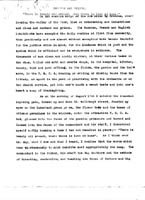 Red Triangle field secretaries submitted reports on a weekly, monthly, and annual basis, which were critical to the success of welfare
relief operations for Allied prisoners of war. WPA secretaries not only summarized the programs and activities they introduced and
maintained to assist POW's, they also commented on the conditions they encountered in these prison camps. The secretaries sent copies
of these reports to their respective WPA headquarters, the International Committee in New York or the World's Committee in Geneva
(depending on their affiliation), and the Ministry of War of the country in which they served. In theory, WPA secretaries conducted
an apolitical service to the prisoners of war of all nations. Because the war stretched the man power resources of the neutral embassies,
who were tasked under international law to look after the interests (including the care and welfare of war prisoners) of belligerent states,
WPA secretaries often became their unofficial "eyes and ears" regarding prison environments.1
Red Triangle field secretaries submitted reports on a weekly, monthly, and annual basis, which were critical to the success of welfare
relief operations for Allied prisoners of war. WPA secretaries not only summarized the programs and activities they introduced and
maintained to assist POW's, they also commented on the conditions they encountered in these prison camps. The secretaries sent copies
of these reports to their respective WPA headquarters, the International Committee in New York or the World's Committee in Geneva
(depending on their affiliation), and the Ministry of War of the country in which they served. In theory, WPA secretaries conducted
an apolitical service to the prisoners of war of all nations. Because the war stretched the man power resources of the neutral embassies,
who were tasked under international law to look after the interests (including the care and welfare of war prisoners) of belligerent states,
WPA secretaries often became their unofficial "eyes and ears" regarding prison environments.1
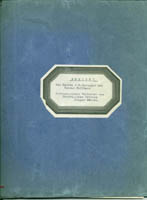 Through WPA reports, YMCA secretaries were successful in harmonizing treatment between different prison camps within the same country by
making the Ministries of War aware of problems. Military officials had a better understanding of how prison camps within their military
districts were administered, outside of official prison camp reports. WPA reports also equalized care and treatment of POW's in belligerent
states through the Principle of Reciprocity. Programs provided by Red Triangle secretaries in one country were usually exported to other
countries.
Through WPA reports, YMCA secretaries were successful in harmonizing treatment between different prison camps within the same country by
making the Ministries of War aware of problems. Military officials had a better understanding of how prison camps within their military
districts were administered, outside of official prison camp reports. WPA reports also equalized care and treatment of POW's in belligerent
states through the Principle of Reciprocity. Programs provided by Red Triangle secretaries in one country were usually exported to other
countries.
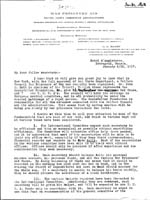 WPA secretaries also had to recognize that their reports were, in effect, diplomatic documents which affected the welfare of millions of
prisoners. Due to the wartime conditions and the desire on the part of the YMCA leadership to gain access to and maintain programs in
prison camps, WPA reports had to be positive and optimistic and not unduly critical of the captor nation. Negative reporting could have
resulted in the expulsion of Red Triangle workers and the collapse of the WPA system across Europe. In practice, YMCA Field Secretaries
served at the pleasure of the Ministry of War in each country. Permission to provide Red Triangle programming could always be withdrawn
with disastrous results for prisoners of war. The WPA secretaries understood these conditions, even when they discovered terrible
conditions and abuse.
WPA secretaries also had to recognize that their reports were, in effect, diplomatic documents which affected the welfare of millions of
prisoners. Due to the wartime conditions and the desire on the part of the YMCA leadership to gain access to and maintain programs in
prison camps, WPA reports had to be positive and optimistic and not unduly critical of the captor nation. Negative reporting could have
resulted in the expulsion of Red Triangle workers and the collapse of the WPA system across Europe. In practice, YMCA Field Secretaries
served at the pleasure of the Ministry of War in each country. Permission to provide Red Triangle programming could always be withdrawn
with disastrous results for prisoners of war. The WPA secretaries understood these conditions, even when they discovered terrible
conditions and abuse.
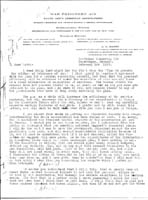 This appendix provides examples of five WPA reports written by American YMCA secretaries. The first was written by Achibald C. Harte,
early in 1915, on the conditions he found at Crossen-an-der-Oder. The second report was written by James E. Sprunger and Conrad Hoffman
in November 1915. It describes the prisons they visited in the XIV and XVIII Army Corps (Halle, Carlsruhe, Darmstadt, Wetzlar, Limburg,
Worms, Giessen, and Rastatt) in western Germany. A third report, written by Archibald Harte to WPA secretaries in Russia in January 1917,
highlights the importance of maintaining a strictly neutral stance in terms of actions and reporting on POW issues in their reports.
This appendix provides examples of five WPA reports written by American YMCA secretaries. The first was written by Achibald C. Harte,
early in 1915, on the conditions he found at Crossen-an-der-Oder. The second report was written by James E. Sprunger and Conrad Hoffman
in November 1915. It describes the prisons they visited in the XIV and XVIII Army Corps (Halle, Carlsruhe, Darmstadt, Wetzlar, Limburg,
Worms, Giessen, and Rastatt) in western Germany. A third report, written by Archibald Harte to WPA secretaries in Russia in January 1917,
highlights the importance of maintaining a strictly neutral stance in terms of actions and reporting on POW issues in their reports.
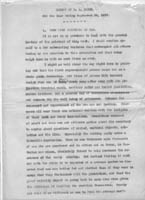 Harte wrote the fourth report to John R. Mott early in February 1917 when the WPA was finally on track in terms of providing services
to prisoners of war. Harte laments the loss of his papers in Russia ("stolen or lost") and discusses the new plan for a central WPA
administration. The bottom line, in his opinion, is secretarial access to financial resources to truly help destitute prisoners. The
final report was written by E. O. Jacob in September 1917, after he had departed Germany and had the opportunity to write a frank
assessment of the conditions he viewed in the Reich.
Harte wrote the fourth report to John R. Mott early in February 1917 when the WPA was finally on track in terms of providing services
to prisoners of war. Harte laments the loss of his papers in Russia ("stolen or lost") and discusses the new plan for a central WPA
administration. The bottom line, in his opinion, is secretarial access to financial resources to truly help destitute prisoners. The
final report was written by E. O. Jacob in September 1917, after he had departed Germany and had the opportunity to write a frank
assessment of the conditions he viewed in the Reich.
Notes:
Note 1: Archibald C. Harte, "Crossen War Prizon," ca. 1915. Armed Services Records Box 53, Folder: "Prisoners of War in Germany-1914-1915," Kautz Family YMCA Archives, University of Minnesota, Minneapolis, MN. back
Note 2: James E. Sprunger and Conrad Hoffman, "Bericht der Herrn J.E. Sprunger und Conrad Hoffmann," November 1915. Armed Services Records Box 53, Folder: "Prisoners of War in Germany-1914-1915," Kautz Family YMCA Archives, University of Minnesota, Minneapolis, MN. back
Note 3: Archibald C. Harte to WPA Secretaries in Russia, Petrograd, 9/22 January 1917. Armed Services Records Box 55, Folder: "Prisoner of War Work Reports to John R. Mott-1917-1919," Kautz Family YMCA Archives, University of Minnesota, Minneapolis, MN. back
Note 4: Archibald C. Harte to John R. Mott, Copenhagen, 1 February 1917. Armed Services Records Box 55, Folder: "Prisoner of War Work Reports to John R. Mott-1917-1919," Kautz Family YMCA Archives, University of Minnesota, Minneapolis, MN. back
Note 5: E. O. Jacob, "Report of E. O. Jacob for the Year Ending September 30, 1917," September 1917. Armed Services Records Box 130, Folder: "Prisoner of War Work for Germany-E. O. Jacob Report, 1917," Kautz Family YMCA Archives, University of Minnesota, Minneapolis, MN. back